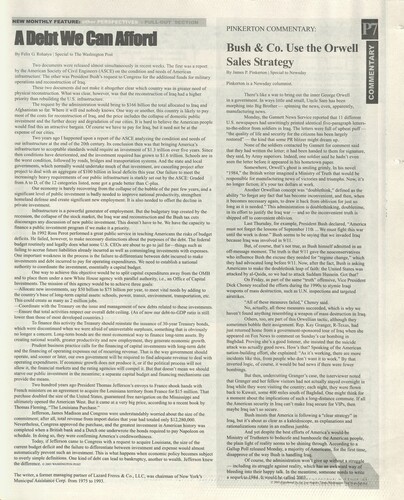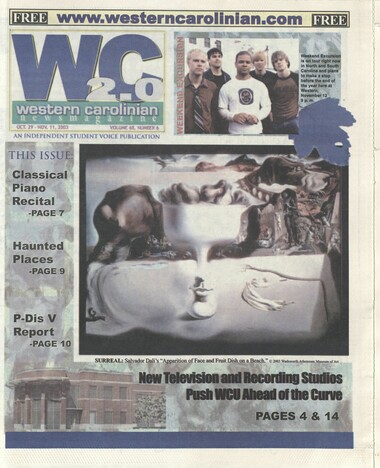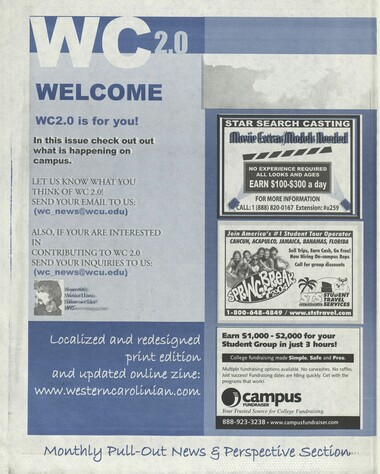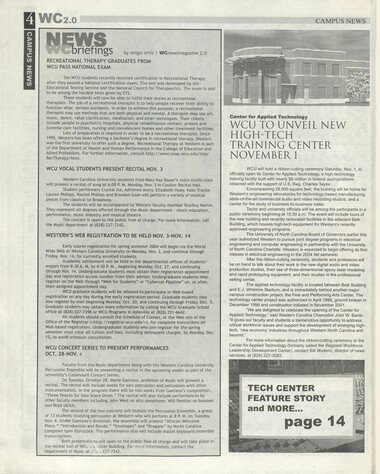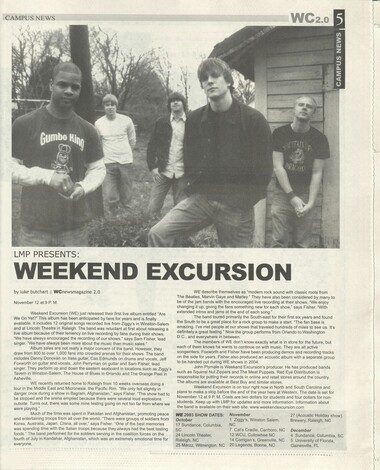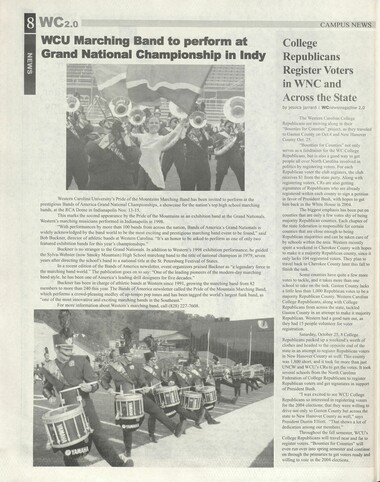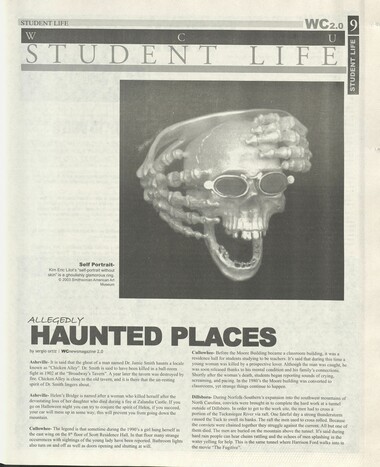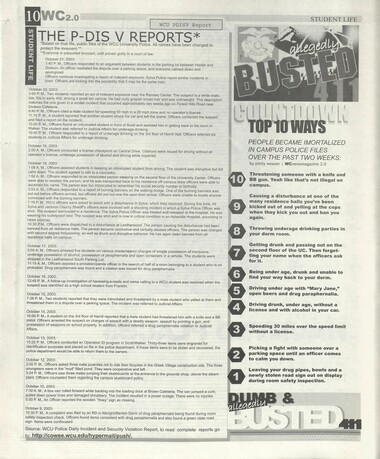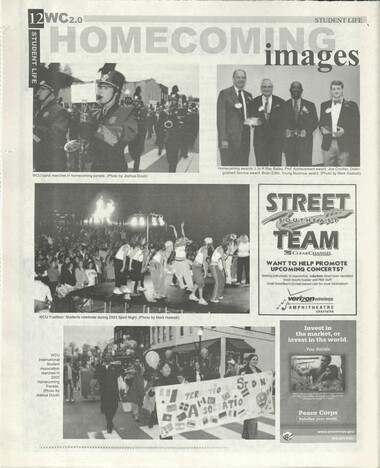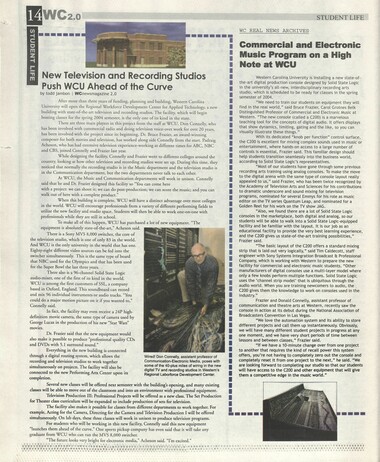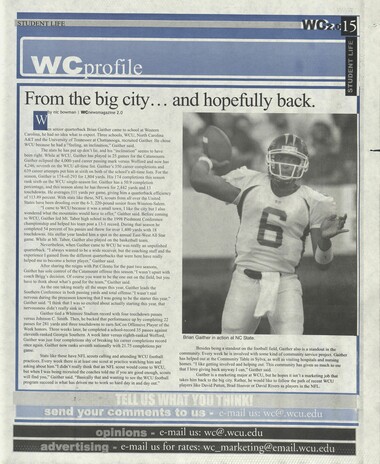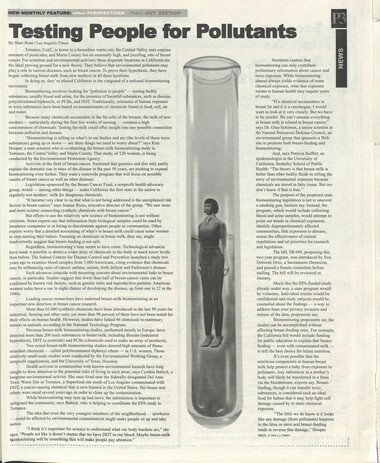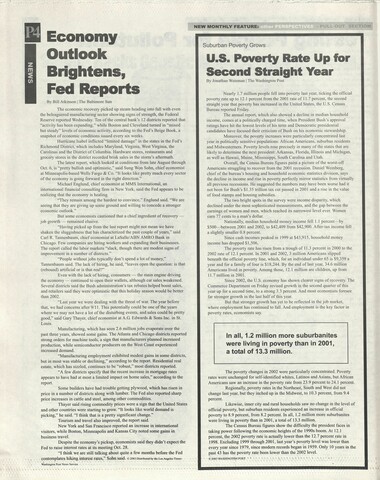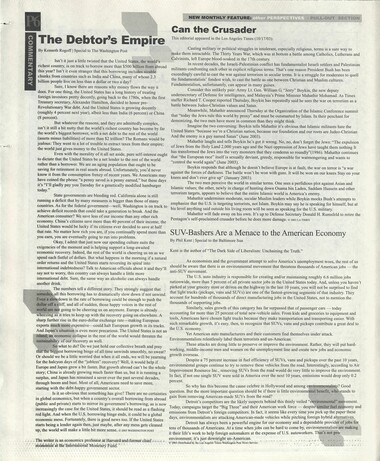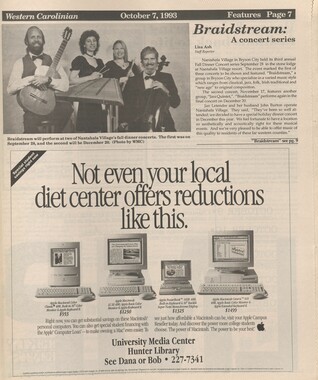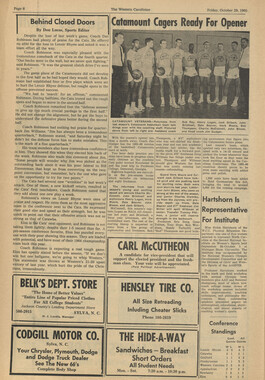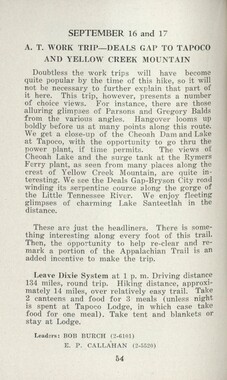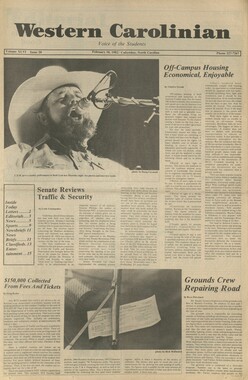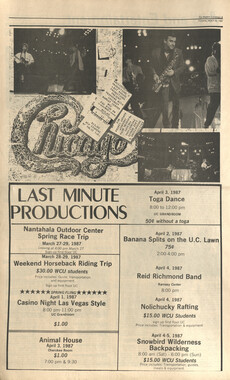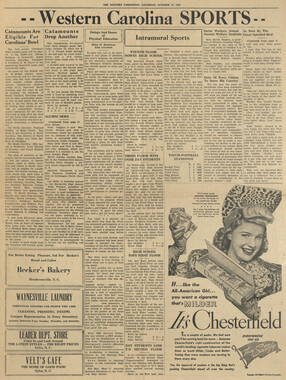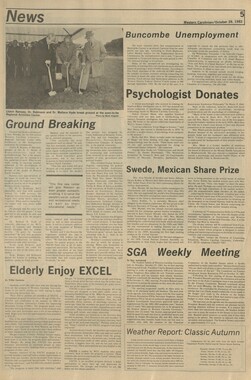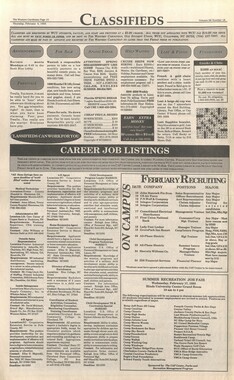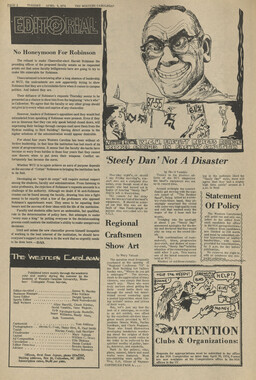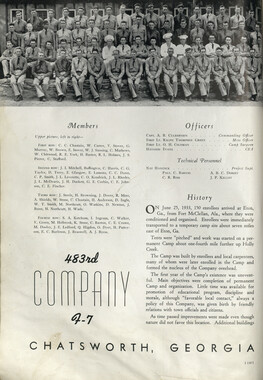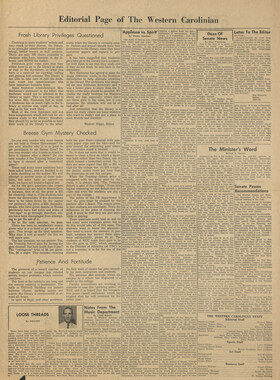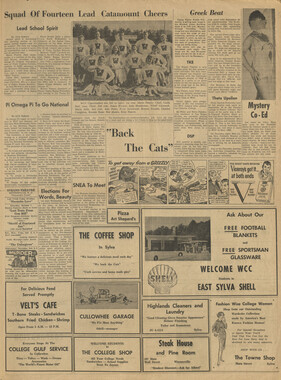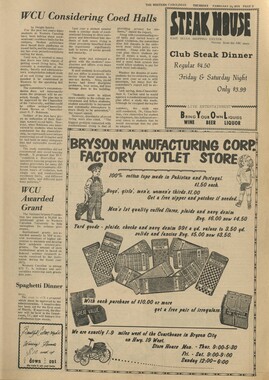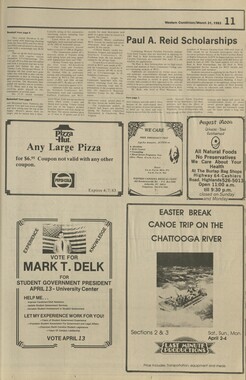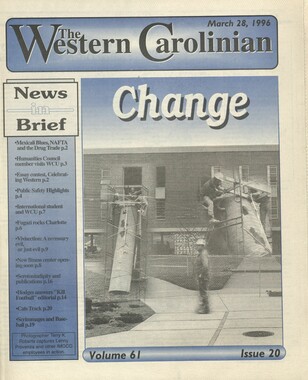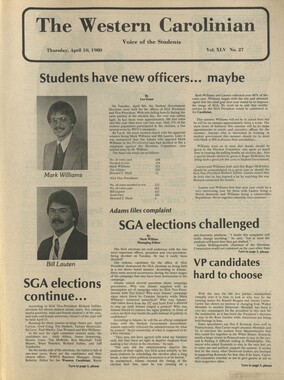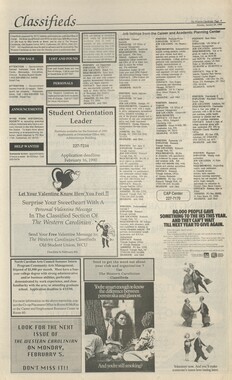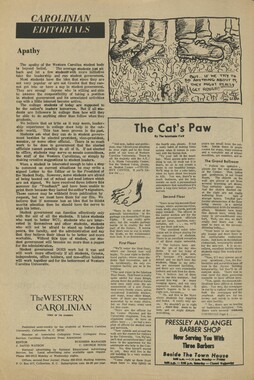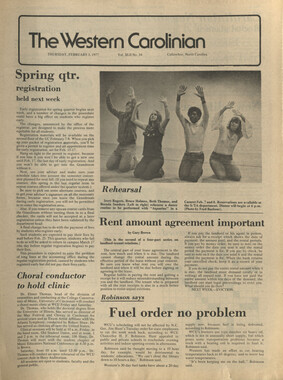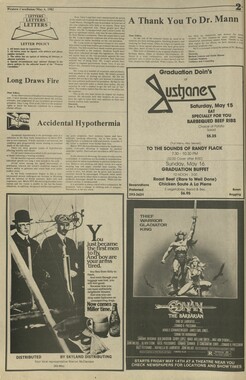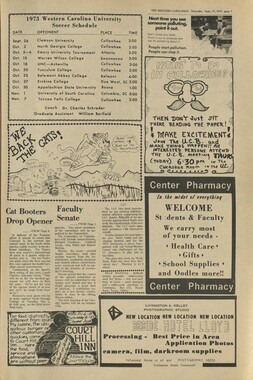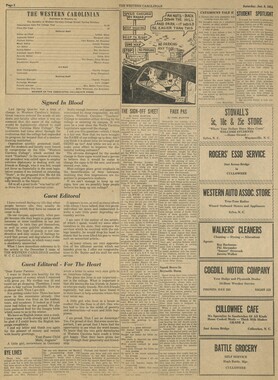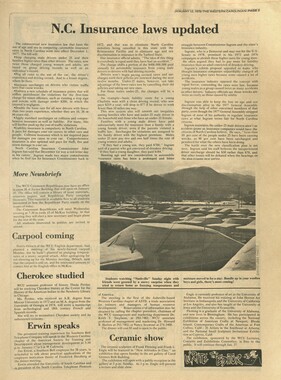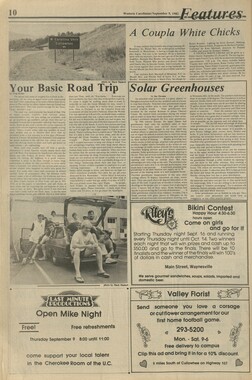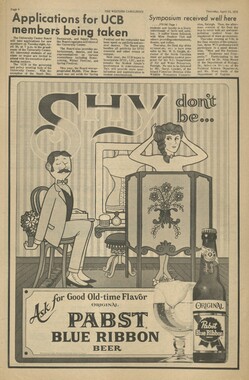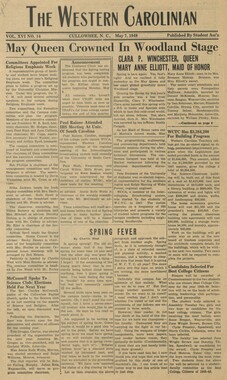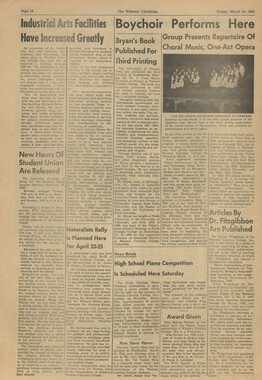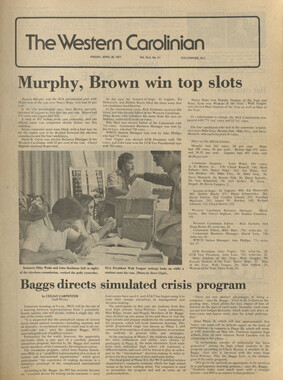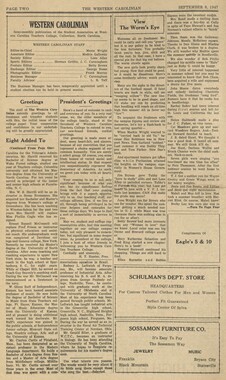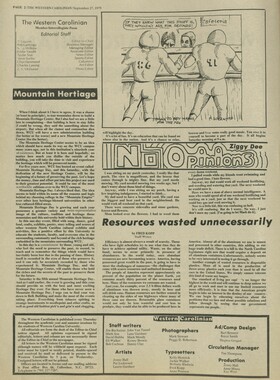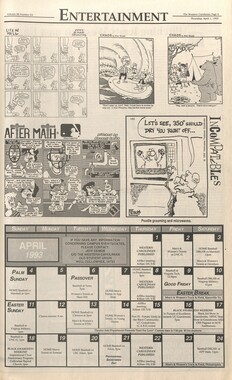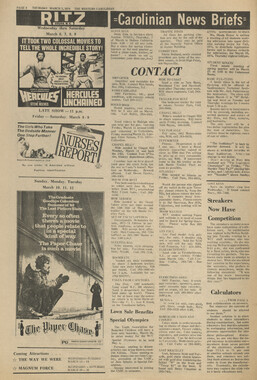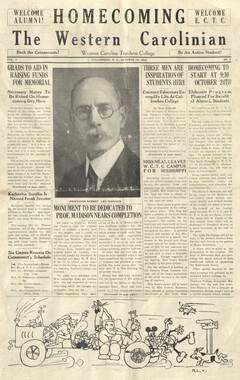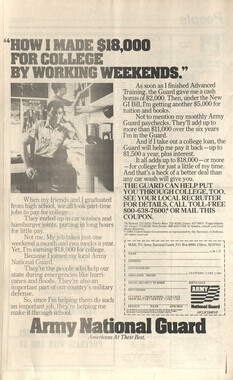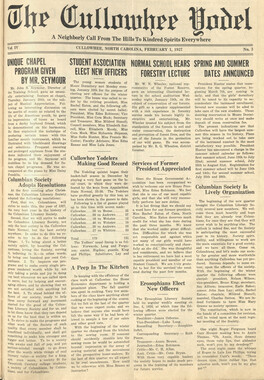Western Carolina University (20)
View all
- Canton Champion Fibre Company (2308)
- Cherokee Traditions (291)
- Civil War in Southern Appalachia (165)
- Craft Revival (1942)
- Great Smoky Mountains - A Park for America (2946)
- Highlights from Western Carolina University (430)
- Horace Kephart (941)
- Journeys Through Jackson (159)
- LGBTQIA+ Archive of Jackson County (85)
- Oral Histories of Western North Carolina (314)
- Picturing Appalachia (6873)
- Stories of Mountain Folk (413)
- Travel Western North Carolina (160)
- Western Carolina University Fine Art Museum Vitreograph Collection (129)
- Western Carolina University Herbarium (92)
- Western Carolina University: Making Memories (738)
- Western Carolina University Publications (2491)
- Western Carolina University Restricted Electronic Theses and Dissertations (146)
- Western North Carolina Regional Maps (71)
- World War II in Southern Appalachia (131)
University of North Carolina Asheville (6)
View all
- Allanstand Cottage Industries (62)
- Appalachian National Park Association (53)
- Bennett, Kelly, 1890-1974 (1463)
- Berry, Walter (76)
- Brasstown Carvers (40)
- Carver, George Washington, 1864?-1943 (26)
- Cathey, Joseph, 1803-1874 (1)
- Champion Fibre Company (233)
- Champion Paper and Fibre Company (297)
- Cherokee Indian Fair Association (16)
- Cherokee Language Program (22)
- Crowe, Amanda (40)
- Edmonston, Thomas Benton, 1842-1907 (7)
- Ensley, A. L. (Abraham Lincoln), 1865-1948 (275)
- Fromer, Irving Rhodes, 1913-1994 (70)
- George Butz (BFS 1907) (46)
- Goodrich, Frances Louisa (120)
- Grant, George Alexander, 1891-1964 (96)
- Heard, Marian Gladys (60)
- Kephart, Calvin, 1883-1969 (15)
- Kephart, Horace, 1862-1931 (313)
- Kephart, Laura, 1862-1954 (39)
- Laney, Gideon Thomas, 1889-1976 (439)
- Masa, George, 1881-1933 (61)
- McElhinney, William Julian, 1896-1953 (44)
- Niggli, Josephina, 1910-1983 (10)
- North Carolina Park Commission (105)
- Osborne, Kezia Stradley (9)
- Owens, Samuel Robert, 1918-1995 (11)
- Penland Weavers and Potters (36)
- Roberts, Vivienne (15)
- Roth, Albert, 1890-1974 (142)
- Schenck, Carl Alwin, 1868-1955 (1)
- Sherrill's Photography Studio (2565)
- Southern Highland Handicraft Guild (127)
- Southern Highlanders, Inc. (71)
- Stalcup, Jesse Bryson (46)
- Stearns, I. K. (213)
- Thompson, James Edward, 1880-1976 (226)
- United States. Indian Arts and Crafts Board (130)
- USFS (683)
- Vance, Zebulon Baird, 1830-1894 (1)
- Weaver, Zebulon, 1872-1948 (58)
- Western Carolina College (230)
- Western Carolina Teachers College (282)
- Western Carolina University (2008)
- Western Carolina University. Mountain Heritage Center (18)
- Whitman, Walt, 1819-1892 (10)
- Wilburn, Hiram Coleman, 1880-1967 (73)
- Williams, Isadora (3)
- Cain, Doreyl Ammons (0)
- Crittenden, Lorraine (0)
- Rhodes, Judy (0)
- Smith, Edward Clark (0)
- Appalachian Region, Southern (2569)
- Asheville (N.C.) (1923)
- Avery County (N.C.) (26)
- Blount County (Tenn.) (195)
- Buncombe County (N.C.) (1672)
- Cherokee County (N.C.) (283)
- Clay County (N.C.) (555)
- Graham County (N.C.) (236)
- Great Smoky Mountains National Park (N.C. and Tenn.) (519)
- Haywood County (N.C.) (3569)
- Henderson County (N.C.) (70)
- Jackson County (N.C.) (4912)
- Knox County (Tenn.) (35)
- Knoxville (Tenn.) (13)
- Lake Santeetlah (N.C.) (10)
- Macon County (N.C.) (420)
- Madison County (N.C.) (215)
- McDowell County (N.C.) (39)
- Mitchell County (N.C.) (132)
- Polk County (N.C.) (35)
- Qualla Boundary (982)
- Rutherford County (N.C.) (76)
- Swain County (N.C.) (2182)
- Transylvania County (N.C.) (270)
- Watauga County (N.C.) (12)
- Waynesville (N.C.) (86)
- Yancey County (N.C.) (72)
- Aerial Photographs (3)
- Aerial Views (60)
- Albums (books) (4)
- Articles (1)
- Artifacts (object Genre) (228)
- Bibliographies (1)
- Biography (general Genre) (2)
- Cards (information Artifacts) (38)
- Clippings (information Artifacts) (191)
- Copybooks (instructional Materials) (3)
- Crafts (art Genres) (622)
- Depictions (visual Works) (21)
- Design Drawings (1)
- Drawings (visual Works) (185)
- Envelopes (73)
- Exhibitions (events) (1)
- Facsimiles (reproductions) (1)
- Fiction (general Genre) (4)
- Financial Records (12)
- Fliers (printed Matter) (67)
- Glass Plate Negatives (381)
- Guidebooks (2)
- Internegatives (10)
- Interviews (815)
- Land Surveys (102)
- Letters (correspondence) (1013)
- Manuscripts (documents) (618)
- Maps (documents) (177)
- Memorandums (25)
- Minutes (administrative Records) (59)
- Negatives (photographs) (6090)
- Newsletters (1290)
- Newspapers (2)
- Notebooks (8)
- Occupation Currency (1)
- Paintings (visual Works) (1)
- Pen And Ink Drawings (1)
- Periodicals (193)
- Personal Narratives (10)
- Photographs (12976)
- Plans (maps) (1)
- Poetry (5)
- Portraits (4568)
- Postcards (329)
- Programs (documents) (181)
- Publications (documents) (2443)
- Questionnaires (65)
- Relief Prints (26)
- Sayings (literary Genre) (1)
- Scrapbooks (282)
- Sheet Music (2)
- Slides (photographs) (402)
- Songs (musical Compositions) (2)
- Sound Recordings (796)
- Specimens (92)
- Speeches (documents) (18)
- Tintypes (photographs) (8)
- Transcripts (322)
- Video Recordings (physical Artifacts) (23)
- Text Messages (0)
- A.L. Ensley Collection (275)
- Appalachian Industrial School Records (7)
- Appalachian National Park Association Records (336)
- Axley-Meroney Collection (2)
- Bayard Wootten Photograph Collection (20)
- Bethel Rural Community Organization Collection (7)
- Blumer Collection (5)
- C.W. Slagle Collection (20)
- Canton Area Historical Museum (2110)
- Carlos C. Campbell Collection (462)
- Cataloochee History Project (64)
- Cherokee Studies Collection (4)
- Daisy Dame Photograph Album (5)
- Daniel Boone VI Collection (1)
- Doris Ulmann Photograph Collection (112)
- Elizabeth H. Lasley Collection (1)
- Elizabeth Woolworth Szold Fleharty Collection (4)
- Frank Fry Collection (95)
- George Masa Collection (173)
- Gideon Laney Collection (452)
- Hazel Scarborough Collection (2)
- Hiram C. Wilburn Papers (28)
- Historic Photographs Collection (236)
- Horace Kephart Collection (861)
- Humbard Collection (33)
- Hunter and Weaver Families Collection (1)
- I. D. Blumenthal Collection (4)
- Isadora Williams Collection (4)
- Jesse Bryson Stalcup Collection (47)
- Jim Thompson Collection (224)
- John B. Battle Collection (7)
- John C. Campbell Folk School Records (80)
- John Parris Collection (6)
- Judaculla Rock project (2)
- Kelly Bennett Collection (1482)
- Love Family Papers (11)
- Major Wiley Parris Civil War Letters (3)
- Map Collection (12)
- McFee-Misemer Civil War Letters (34)
- Mountain Heritage Center Collection (4)
- Norburn - Robertson - Thomson Families Collection (44)
- Pauline Hood Collection (7)
- Pre-Guild Collection (2)
- Qualla Arts and Crafts Mutual Collection (12)
- R.A. Romanes Collection (681)
- Rosser H. Taylor Collection (1)
- Samuel Robert Owens Collection (94)
- Sara Madison Collection (144)
- Sherrill Studio Photo Collection (2558)
- Smoky Mountains Hiking Club Collection (616)
- Stories of Mountain Folk - Radio Programs (374)
- The Reporter, Western Carolina University (510)
- Venoy and Elizabeth Reed Collection (16)
- WCU Gender and Sexuality Oral History Project (32)
- WCU Mountain Heritage Center Oral Histories (25)
- WCU Oral History Collection - Mountain People, Mountain Lives (71)
- WCU Students Newspapers Collection (1923)
- Western North Carolina Tomorrow Black Oral History Project (69)
- William Williams Stringfield Collection (2)
- Zebulon Weaver Collection (109)
- African Americans (390)
- Appalachian Trail (35)
- Artisans (521)
- Cherokee art (84)
- Cherokee artists -- North Carolina (10)
- Cherokee language (21)
- Cherokee pottery (101)
- Cherokee women (208)
- Church buildings (189)
- Civilian Conservation Corps (U.S.) (111)
- College student newspapers and periodicals (2012)
- Dams (107)
- Dance (1023)
- Education (222)
- Floods (61)
- Folk music (1015)
- Forced removal, 1813-1903 (2)
- Forest conservation (220)
- Forests and forestry (1184)
- Gender nonconformity (4)
- Great Smoky Mountains National Park (N.C. and Tenn.) (181)
- Hunting (45)
- Landscape photography (25)
- Logging (119)
- Maps (83)
- Mines and mineral resources (8)
- North Carolina -- Maps (18)
- Paper industry (38)
- Postcards (255)
- Pottery (135)
- Railroad trains (72)
- Rural electrification -- North Carolina, Western (3)
- School integration -- Southern States (2)
- Segregation -- North Carolina, Western (5)
- Slavery (5)
- Sports (452)
- Storytelling (243)
- Waterfalls -- Great Smoky Mountains (N.C. and Tenn.) (66)
- Weaving -- Appalachian Region, Southern (280)
- Wood-carving -- Appalachian Region, Southern (328)
- World War, 1939-1945 (173)
Western Carolinian Volume 68 Number 06
Item
Item’s are ‘child’ level descriptions to ‘parent’ objects, (e.g. one page of a whole book).
-
-
By Felix G, Rohatyn | Special to The Washington Post Two documents were released almost simultaneously in recent weeks. The first was a report by the American Society of Civil Engineers (ASCE) on the condition and needs of American infrastructure. The other was President Bushs request to Congress for the additional funds for military operations and reconstruction of Iraq. These two documents did not make it altogether clear which country was in greater need of physical reconstruction. What was clear, however, was that the reconstruction of Iraq had a higher priority than rebuilding the U.S. infrastructure. The request by the administration would bring to $166 billion the total allocated to Iraq and Afghanistan so far. Where it will end nobody knows. One way or another, this country is likely to pay most of the costs for reconstruction of Iraq, and the price includes the collapse of domestic public investment and the further decay and degradation of our cities. It is hard to believe the American people would find this an attractive bargain. Of course we have to pay for Iraq, but it need not be at the expense of our cities. Two years ago I happened upon a report of the ASCE analyzing the condition and needs of our infrastructure at the end of the 20th century. Its conclusion then was that bringing Americas infrastructure to acceptable standards would require an investment of $1.3 trillion over five years. Since then conditions have deteriorated, and the investment required has grown to $1.6 trillion. Schools are in the worst condition, followed by roads, bridges and transportation systems. And the state and local governments, which normally would undertake much of that investment, are canceling project after project to deal with an aggregate of $100 billion in local deficits this year. Our failure to meet the increasingly heavy requirements of our public infrastructure is starkly set out by the ASCE: Graded from A to D, of the 12 categories listed, none got a grade better than C-plus. Our economy is barely recovering from the collapse of the bubble of the past few years, and a significant level of public investment is badly needed to improve national productivity, strengthen homeland defense and create significant new employment. It is also needed to offset the decline in private investment. ; Infrastructure is a powerful generator of employment. But the budgetary trap created by the recession, the collapse of the stock market, the Iraq war and reconstruction and the Bush tax cuts discourages any discussion of new public investment. This doesnt have to be. We have the capacity to finance a public investment program if we make it a priority. In 1992 Ross Perot performed a great public service in teaching Americans the risks of budget deficits. He failed, however, to make necessary distinctions about the purposes of the debt. The federal budget routinely and legally does what some U.S. CEOs are about to go to jail forthings such as failing to accrue future liabilities already incurred as well as commingling investments with expenses. One important weakness in the process is the failure to differentiate between debt incurred to make investments and debt incurred to pay for operating expenditures. We need to establish a national authority to coordinate the investment, essentially a capital budget. One way to achieve this objective would be to split capital expenditures away from the OMB and to place them under a new White House agency with parallel authority, i.e., an Office of Capital Investments. The mission of this agency would be to achieve three goals: Allocate new investments, say $50 billion to $75 billion per year, to meet vital needs by adding to the countrys base of long-term capital assets: schools, power, transit, environment, transportation, etc. This could create as many as 2 million jobs. Coordinate with the Treasury on the issue and management of new debts related to these investments. Ensure that total activities respect our overall debt ceiling. (As of now our debt-to-GDP ratio is still lower than those of most developed countries.) To finance this activity the Treasury should reinstate the issuance of 30-year Treasury bonds, which were discontinued when we were afraid of uninvestable surpluses, something that is obviously no longer a concern. Long-term bonds are the most economical way to finance long-term assets. By creating national wealth, greater productivity and new employment, they generate economic growth. Prudent business practice calls for the financing of capital investments with long-term debt and the financing of operating expenses out of recurring revenue. That is the way government should operate, and sooner or later, our own government will be required to find adequate revenue to deal with operating expenditures. If economic growth does not produce it, or if the political process will not allow it, the financial markets and the rating agencies will compel it. But that doesnt mean we should starve our public investment in the meantime; a separate capital budget and financing mechanisms can provide the means. Two hundred years ago President Thomas Jeffersons envoys to France shook hands with French ministers on an agreement to acquire the Louisiana territory from France for $15 million. That purchase doubled the size of the United States, guaranteed free navigation on the Mississippi and ultimately opened the American West. But it came at a very big price, according to a recent book by Thomas Fleming, The Louisiana Purchase. Jefferson, James Madison and Congress were understandably worried about the size of the commitment; after all, total revenue from import duties that year had totaled only $12,280,000. Nevertheless, Congress approved the purchase, and the greatest investment in American history was completed when a British bank and a Dutch one underwrote the bonds required to pay Napoleon on schedule. In doing so, they were confirming Americas creditworthiness. Today, if Jefferson came to Congress with a request to acquire Louisiana, the size of the current budget deficit and the failure to differentiate between investment and expense would almost automatically prevent such an investment. This is what happens when economic policy becomes subject to overly simple definitions. One kind of debt can lead to bankruptcy, another to wealth. Jefferson knew the difference. 2003 WASHINGTON post The writer, a former managing partner of Lazard Freres & Co. , LLC, was chairman of New Yorks Municipal Assistance Corp. from 1975 to 1993. wee: PINKERTON COMMENTARY: Bush & Co. Use the Orwell Sales Strategy By James P. Pinkerton | Special to Newsday Pinkerton is a Newsday columnist. Theres like a war to bring out the inner George Orwell in a government. In ways little and small, Uncle Sam has been morphing into Big Brother spinning the news, even, apparently, manufacturing news. Monday, the Gannett News Service reported that 11 different U.S. newspapers had unwittingly printed identical five-paragraph letters- to-the-editor from soldiers in Iraq. The letters were full of upbeat puff the quality of life and security for the citizens has been largely restored the kind that some PR blitzer might dream up. None of the soldiers contacted by Gannett for comment said that they had written the letter; it had been handed to them for signature, they said, by Army superiors. Indeed, one soldier said he hadnt even seen the letter before it appeared in his hometown paper. Somewhere, Orwells ghost is smiling grimly. In his novel 1984, the British writer imagined a Ministry of Truth that would be responsible for manufacturing news of victories and triumphs. Now, its no longer fiction; its your tax dollars at work. Another Orwellian concept was doublethiak, defined as the ability to forget any fact that has become inconvenient, and then, when it becomes necessary again, to draw it back from oblivion for just so long as it is needed. This administration is doublethinking, doubletime, in its effort to justify the Iraq war and so the inconvenient truth is shipped off to convenient oblivion. Last Thursday, for example, President Bush declared, America must not forget the lessons of September 11th ... We must fight this war until the work is done. Bush seems to be saying that we invaded a, because Iraq was involved in 9/11. But, of course, thats not true, as Bush himself admitted in an off-message moment. The truth is that 9/11 gave the neoconservatives who influence Bush the excuse they needed for regime change, which they had advocated long before 9/11. Now, after the fact, Bush is asking Americans to make the doublethink leap of faith: the United States was attacked by al-Qaida, so we had to attack Saddam Hussein. Got that? On Friday, as part of the same truth offensive, Vice President Dick Cheney recalled the efforts during the 1990s to stymie Iraqi weapons of mass destruction, such as U.N. inspections and targeted airstrikes. All of these measures failed, Cheney said. No, actually, all those measures succeeded, which is why we havent found anything resembling a weapon of mass destruction in Iraq. Others, too, are part of this Orwellian tactic, although they sometimes bobble their assignment. Rep. Kay Granger, R-Texas, had just returned home from a government-sponsored tour of Iraq when she appeared on Fox News to comment on Sundays car bombing in Baghdad. Proving shes a good listener, she insisted that the suicide attack was actually good news. Hows that? Speaking of the American nation-building effort, she explained: As its working, there are more incidents like this, from people who dont want it to work. By that inverted logic, of course, it would be bad news if there were fewer bombings. But then, undercutting Grangers case, the interviewer noted that Granger and her fellow visitors had not actually stayed overnight in Iraq while they were visiting the country; each night, they were flown back to Kuwait, some 400 miles south of Baghdad. One might think for a moment about the implications of such a long-distance commute. If all the American security in Iraq cant make Iraq secure for VIPs, then maybe Iraq isnt so secure. Bush insists that America is following a clear strategy in Iraq, but its about as clear as a kaleidoscope, as explanations and rationalizations rotate in an endless jumble. And yet despite the best efforts of Ameri Ministry of Truthsters to bedazzle and bamboozle th: the plain light of reality seems to be shining through. Gallup Poll released Monday, a majority o disapprove of the way Bush is handling Iraq. Of course, the administration won including its struggle against reality, which bleeding into their happy talk. In the meantime, someone n a sequel) to,1984..1t would-be-called 2003.5... 50.000 Mes takimata Graft tel thre toa oy for ie first time, COMMENTARY
Object
Object’s are ‘parent’ level descriptions to ‘children’ items, (e.g. a book with pages).
-
The Western Carolinian is Western Carolina University's student-run newspaper. The paper was published as the Cullowhee Yodel from 1924 to 1931 before changing its name to The Western Carolinian in 1933.
-

